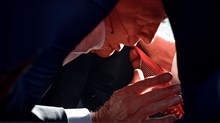In 1935, a Chinese preacher in his mid 30s stood on a makeshift stage in Singapore conducting a Presbyterian-hosted revival. Chinese theologian Timothy Tow, a boyhood convert of that week, described John Sung as "attired in a light white Chinese gown … with a shock of black hair flapping his high forehead, he was jabbing away … 'You ought to die, to die!'" Sung then proceeded to act out and shout out the biblical story of Sodom and Gomorrah. It was an athletic performance, but not quite as energetic as the time Sung preached the story of Elisha, who ordered Naaman the Syrian to dip seven times into the Jordan River and receive healing of his leprosy. Sung demonstrated by jumping seven times off the platform. When John Sung spoke, people tended to listen.
Though Sung began as a boy preacher assisting his pastor father, his ministry as an adult evangelist lasted a mere 14 years—from 1927 to 1941, at which time he entered an excruciating three-year illness that took his life. A John Sung revival week would start with a call to public repentance (pastors included), with people instructed to write their sins on paper and personally present them. Then a call to new birth—second and third "new births" welcomed. Next came teachings on holy living, then new converts were organized into bands of three to five men and women instructed to evangelize at least once a week. Many of these were commissioned to become full-time evangelistic bands traveling throughout China and elsewhere. At each stop, the evangelists would organize their converts into small new churches meeting in homes, churches that would then send out fresh bands of evangelists to replicate the process.
In a typical year for Sung (July 1931-July 1932, for example), his team traveled a total of 54,823 miles in China, held 1,199 meetings, preached to more than 400,000 people in 13 provinces, and registered more than 18,000 "decisions" resulting in 3,000 men and women newly committed to full-time evangelism in traveling bands. (See Leslie Lyall, A Biography of John Sung.) On New Year's Day 1932, Sung began the practice of writing a check to God for the coming year—for 100,000 souls "according to his riches in glory." At the time of Sung's death in 1945, missiologists estimated that 10 percent of all Christians in China had experienced direct contact with John Sung.
Much of what happened to Christians inside China during the next three decades remains a mystery. But when the clouds of religious secrecy began to lift in the 1970s, the Christian population had increased as much as ten-fold. It seems likely that many could trace their spiritual lineage by some circuitous route back to John Sung.
During his long final illness, John Sung became more thoughtful than his evangelist persona allowed. The quotations below come from his final years, some of them dictated when he became too weak to write.
On Light
"All Christians must be children of the light and children of the day. We must see what the world fails to see." (Farewell sermon at Huia En Church, Oct. 16, 1940)
On Suffering
"[K]now that all sufferings are the nature of things. They are planned to remove the dregs in ourselves, in order that we can face God without fear." (Letter to Ms. Leona Wu and evangelistic bands in Singapore, Jan. 6, 1941)
On Hidden Paths
"Generally, people love to be uplifted and praised by others … . The Lord Jesus, on the other hand, … found fishermen and enlisted those with no learning and social status as his disciples … . The Lord would have no use for the knowledgeable Saul if he had not been changed to the humble Paul. If Moses were still the prince in his palace and did not become a shepherd, the Lord would have no place for him either. O Lord, may you rid us of our towering ambitions … . May we follow You to do the things that the world hates and walk the paths where few people want to travel." (Letter to Leona Wu and the Nanyang evangelistic bands, April 28, 1941)
On China's Future
"I still hold the view that the day will come when foreign clergymen will leave China, and the mission schools will be no more. God will raise up His own lay disciples and those who are truly blessed will revive the church in China." (Journal, Oct. 1940)
On Home Worship
"While physical churches may be demolished one day, the service and prayers that believers have set up in their own homes shall remain forever."
Carolyn Nystrom is a career writer living in northern Illinois. The life of John Sung is treated more fully in a forthcoming book by Mark Noll and Carolyn Nystrom to be published by InterVarsity Press in 2010.
John Sung was a prodigious journal-keeper, creating some 40 handwritten diaries—in Chinese. These were confiscated from the Sung home in 1966 near the beginning of the Cultural Revolution, but they were protected by someone who recognized their worth, stored in a school, and eventually reclaimed by Sung's daughter Levi (Leviticus) in 1984. Levi compiled direct quotations from these diaries and letters, creating a 500-page book titled in English The Journal Once Lost: Extracts from the Diary of John Sung and published in 2008. All of the above quotations come from this book.
Timothy Tow, John Woodbridge, Leslie Lyall, and Daniel Bays are historians who have studied the impact of John Sung on Chinese Christianity.

Support Our Work
Subscribe to CT for less than $4.25/month




























